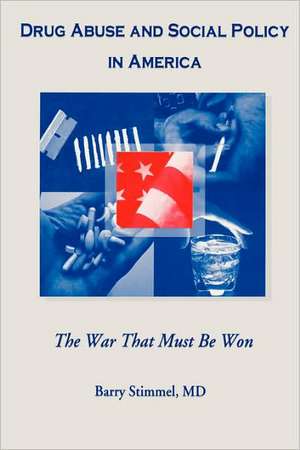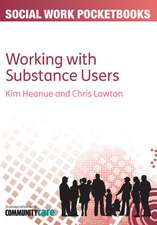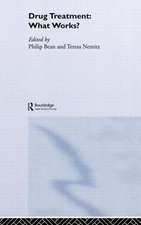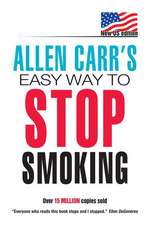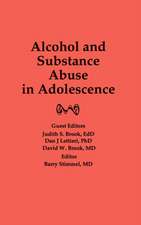Drug Abuse and Social Policy in America: The War That Must Be Won
Autor Barry Stimmelen Limba Engleză Paperback – 7 oct 1996
Currently the leading risk factor associated with the transmission of HIV, illicit drugs continue to destroy the fabric of life in many inner-city communities. Yet, drugs are a problem for Americans from every corner of society, from suburban teenagers to pro athletes to homeless people. Author Barry Stimmel demonstrates in Drug Abuse and Social Policy in America that the drug problem is not being addressed adequately because of a lack of commitment from the majority of Americans and government leaders. The issues Drug Abuse and Social Policy in America asks readers to confront include:
- Why do we provide insufficient treatment facilities and incarcerate users, yet wonder why more prison space is needed?
- Why do we readily agree to build more prisons rather than community centers that provide alternatives for youths?
- Why are we concerned with teenage smoking and drinking, yet allow advertising of these substances?
- Why do we advocate rehabilitation, but not hire people in recovery?
- Why do we ask pregnant women with drug problems to seek help, then try to take custody of their children rather than provide social support while they receive treatment?
Drug Abuse and Social Policy in America challenges academics, practitioners, and future social service providers and policymakers to rethink their entire conception of the problem of substance abuse in America with a cutting question: “Have we made any substantial progress in diminishing the sue of nicotine, the excessive consumption of alcohol, or the inappropriate use of prescription drugs, all of which are responsible for more illnesses and societal costs than all illicit drugs combined?” Identifying this as the place where all efforts to curb drug use must start, Drug Abuse and Social Policy in America offers readers many ways that individuals, communities, organizations, and society can take action and be more effective in convincing both those who consume drugs and those who profit from their sale that their actions are inappropriate and unacceptable.
Preț: 333.82 lei
Preț vechi: 351.38 lei
-5% Nou
Puncte Express: 501
Preț estimativ în valută:
63.88€ • 68.31$ • 53.26£
63.88€ • 68.31$ • 53.26£
Carte tipărită la comandă
Livrare economică 17 aprilie-01 mai
Preluare comenzi: 021 569.72.76
Specificații
ISBN-13: 9780789001283
ISBN-10: 0789001284
Pagini: 232
Dimensiuni: 152 x 229 x 15 mm
Greutate: 0.34 kg
Ediția:New.
Editura: Taylor & Francis
Colecția Routledge
Locul publicării:Oxford, United Kingdom
ISBN-10: 0789001284
Pagini: 232
Dimensiuni: 152 x 229 x 15 mm
Greutate: 0.34 kg
Ediția:New.
Editura: Taylor & Francis
Colecția Routledge
Locul publicării:Oxford, United Kingdom
Public țintă
Professional Practice & DevelopmentCuprins
Contents
Addressing the Use of Mood Altering Drugs: Defining the Problem
Addressing the Use of Mood Altering Drugs: Defining the Problem
- Alcohol, Tobacco, and Sports: That's Entertainment
- The Pharmaceutical Companies: Profits vs. Responsibility
- Physicians and Pharmacists: Potential Unrealized
- The White Collar Crowd
- The Federal Strategy: A Blueprint for Failure
- Accepting Individual Responsibility
- An Agenda for Action: Diminishing Supply
- An Agenda for Action: Diminishing Demand
- An Agenda for Action: Treatment, Evaluation, and Research
- An Agenda for Action: Protection of Those Who Do Not Use Mood Altering Drugs
- Conclusion
- Index
Descriere
Illicit drugs, despite the “war” waged by the United States government, remain a tremendous drain on the American economy and continue to take their toll on the lives of countless Americans. A comprehensive text with an instructor's manual, Drug Abuse and Social Policy in America analyzes why current US policy on the use of licit and illicit mood-altering drugs has failed. This groundbreaking book addresses differences between decriminalization, legalization, and “zero tolerance”—areas and philosophies that are poorly understood—and suggests a multipronged approach to diminish inappropriate drug use. Physicians, health care providers, teachers, law enforcement officers, policymakers, social service providers, and students of public policy and health will gain a better understanding of substance abuse as a societal problem, rather than an individual problem, and see that the billions of dollars spent on law enforcement would be better spent on education, prevention, treatment, and providing alternatives to drug use.
